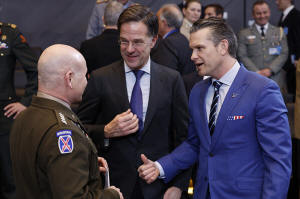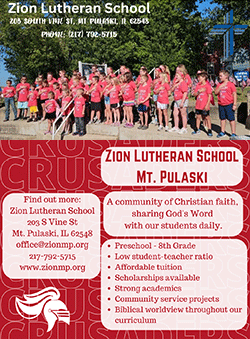NATO allies insist Ukraine and Europe must be in peace talks as Trump
touts Putin meeting
 Send a link to a friend
Send a link to a friend
 [February 13, 2025]
By LORNE COOK [February 13, 2025]
By LORNE COOK
BRUSSELS (AP) — Several NATO allies stressed on Thursday that Ukraine
and Europe must not be cut out of any peace negotiations as U.S. Defense
Secretary Pete Hegseth denied that the United States is betraying the
war-ravaged country.
European governments are reeling after the Trump administration signaled
that it is planning face-to-face talks with Russia on ending the Ukraine
war without involving them, insisted that Kyiv should not join NATO, and
said that it’s up to Europe to protect itself and Ukraine from whatever
Russia might do next.
“There can be no negotiation about Ukraine without Ukraine. And
Ukraine’s voice must be at the heart of any talks,” U.K. Defence
Secretary John Healey told reporters at NATO headquarters, as the
organization’s 32 defense ministers met for talks on Ukraine.
German Defense Minister Boris Pistorius said: “For me, it’s clear … that
Europe must be involved in the negotiations — and I think that’s very
easy to understand,” particularly if Europe is ”supposed to play a
central or the main role in the peace order.”
Europe, he said, “will have to live directly” with the consequences, so
“it goes without saying that we must be part of the negotiations.”
Hegseth denied that the U.S. has betrayed Ukraine by launching
negotiations about its future without Kyiv’s full involvement. After
talks with Putin and then Zelenskyy, Trump said on Wednesday he would
“probably” meet in person with the Russian leader in the near term,
possibly in Saudi Arabia.

“There is no betrayal there. There is a recognition that the whole world
and the United States is invested and interested in peace. A negotiated
peace,” Hegesth told reporters.
Hegseth warned that the war in Ukraine must “be a wakeup call” for
NATO’s European allies to spend more on their own defense budgets.
Twenty-three of the 32 member countries were forecast to have met the
organization’s guideline of spending 2% of gross domestic product on
their national defense budgets last year, but a third still do not.
But Hegseth's French counterpart, Sébastien Lecornu, described the
wrangling over greater defense spending as “a false debate,” saying that
governments and parliaments across Europe are already approving more
weapons purchases and bigger military budgets while helping Ukraine
stave off an invasion.
[to top of second column]
|

United States Secretary of Defense Pete Hegseth, right, speaks with
NATO Secretary General Mark Rutte, center, and NATO's Supreme Allied
Commander Europe General Christopher Cavoli during a meeting of the
North Atlantic Council in defense ministers format at NATO
headquarters in Brussels, Thursday, Feb. 13, 2025. (AP Photo/Geert
Vanden Wijngaert)

Lecornu warned that the future of NATO itself is now in question.
“To say that it’s the biggest and most robust alliance in history is
true, historically speaking. But the real question is will that
still be the case in 10 or 15 years,” he said, after the U.S. — by
far NATO's biggest and most powerful member — signaled that its
security priorities lie elsewhere, including in Asia.
NATO Secretary-General Mark Rutte, who was chairing Thursday's
meeting, said that whatever agreement is struck between Russia and
Ukraine, it is crucial that the “peace deal is enduring, that Putin
knows that this is the end, that he can never again try to capture a
piece of Ukraine.”
Touting Europe's investment in Ukraine, Swedish Defense Minister Pål
Jonson said European nations provided about 60% of the military
support to Kyiv last year and must be involved, especially given
U.S. demands that Europe take more responsibility for Ukraine's
security in the longer term.
“It’s very natural that we’re engaged into the discussions,” Jonson
said.
His Estonian counterpart, Hanno Pevkur, underlined that the European
Union has driven sanctions against Russia, has invested heavily in
Ukraine’s defense, and will be asked to foot the bill for rebuilding
the war-ravaged country.
“We have to be there. So there is no question about it. Otherwise
this peace will not be long lasting,” Pevkur warned.
___
Geir Moulson in Berlin contributed to this report.
All contents © copyright 2025 Associated Press. All rights reserved
 |